The BYU corpora are used by
more than 60,000 distinct
people each month (including
more than 11,000 professors), which makes them the most
widely-used corpora in existence.
|
From the point of
view of BYU, the important point is that the
BYU corpora are used more than almost
any other web-based resource at BYU, including Learning Suite, all of the
resources from the library, and the entire BYU Independent Study website.
|
The
following data comes from
Alexa (owned and operated
by Amazon), which gives detailed information on more
than 1,000,000 websites worldwide. The
page for BYU.EDU at Alexa (archived
copy) shows a wealth of
information about the websites at BYU, as well as
the users of these websites.
Perhaps the most important data comes
from the section entitled "Where do visitors go on byu.edu". The following data
comes from June 2017, and it shows that (except for cas.byu.edu), the BYU
corpora are the mostly widely used resource at BYU (scroll down at
http://www.alexa.com/siteinfo/byu.edu to see this on the Amazon Alexa site):

Previous data from Winter 2017 (when more students
were at BYU) shows the
forty or so most
visited sites at BYU, and an
expanded
list shows the top 110 sites.
(Continued below)
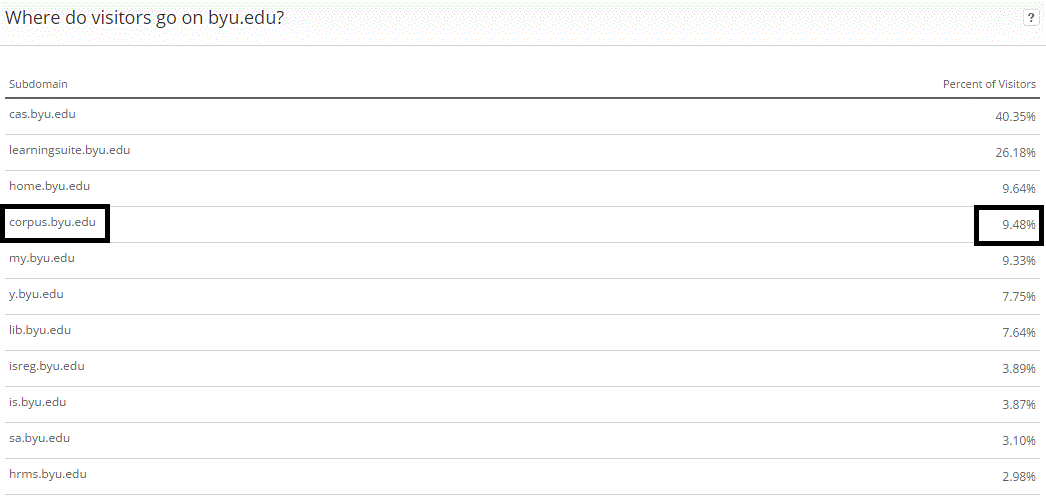
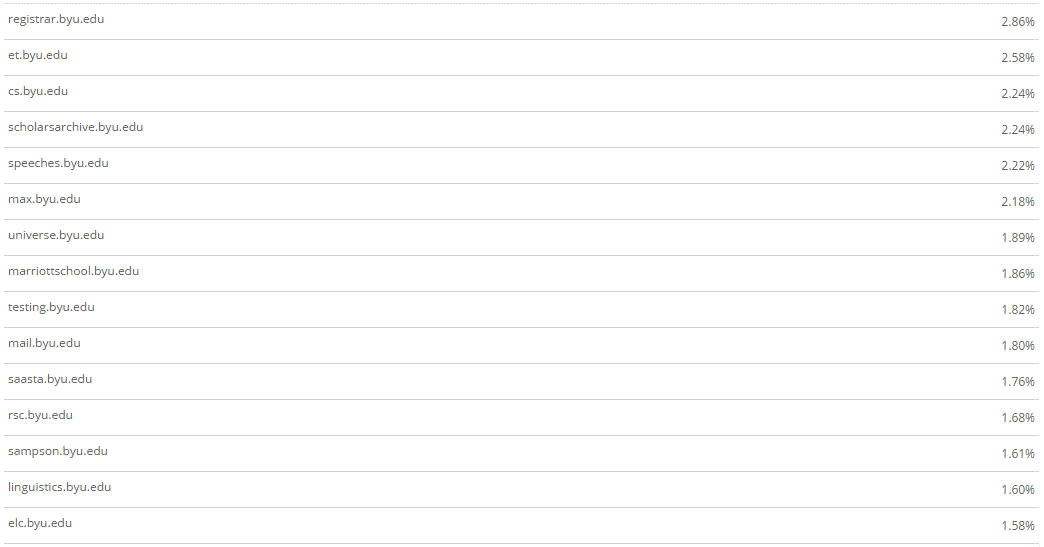
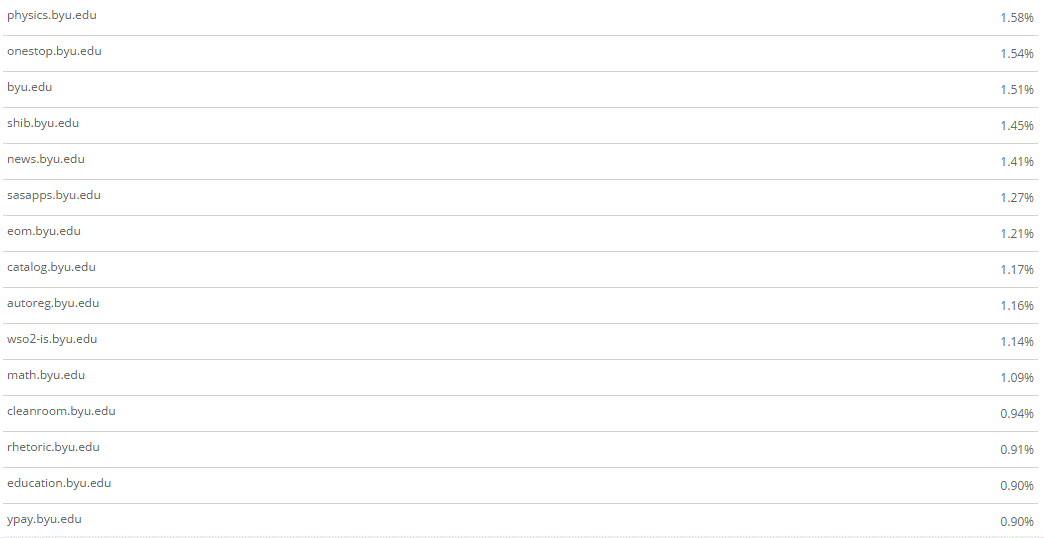
As can be seen,
corpus.byu.edu is near the very top of the
list. The only BYU site that has more users is
cas.byu.edu (which is used to
log users on securely to sites throughout campus). The
corpus.byu.edu site is even ahead of other
widely-used sites like
home.byu.edu (the main landing site for
visitors to BYU),
my.byu.edu, y.byu.edu,
and sa.byu.edu.
|
Perhaps most interestingly,
corpus.byu.edu is used more than many other
sites that are more "visible" and well-known (at
least to the BYU community), such as
Learning Suite (learningsuite.byu.edu;
used for thousands of classes at BYU), the
library website (lib.byu.edu),
the entire Independent Study site (is.byu.edu),
devotional and forum addresses (speeches.byu.edu),
the Daily Universe (universe.byu.edu)
and the Religious Studies Center (rsc.byu.edu).
In fact, the BYU corpora are used more than five
times as much as the Daily Universe or the Religious
Studies Center websites, and nearly three times as
much as the entire Independent Studies website. |
As far as other academic units on campus, the
most widely-accessed websites are for Computer
Science (cs.byu.edu), Engineering and
Technology (et.byu.edu),
the Marriott School of Business (marriott.byu.edu),
and the BYU Law School (law.byu.edu). But the BYU
corpora are used more than the websites of all
of these academic units ... combined. And the
only department in the College of Humanities that
appears in the top 110 websites is
linguistics.byu.edu -- probably because it is linked
to from the corpus.byu.edu homepage. This suggests
that
the BYU corpora are used far more than the
combined total of all
of the other (college-level and departmental)
websites from the entire College of
Humanities.
There are additional data
that point to the wide use of the BYU
corpora, compared to other resources at BYU. For
example, other than honor code and
academic calendar, "corpus" is the most common
search term for all resources at BYU, followed high
on the list by coca and google books
(two of the BYU corpora). (See a
more complete list,
and a list of all
corpus-related
search terms for BYU.)
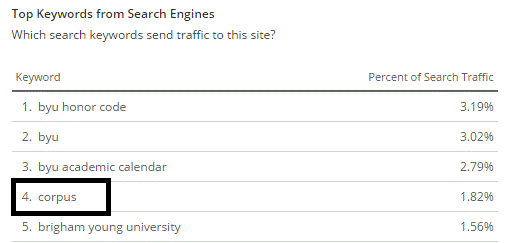
Finally, it is interesting to see how the
visitors' country of origin is related to the BYU corpora. The following chart
from Alexa shows that after the United States, the
three countries with the most visitors to BYU are China,
Japan, and India (followed in the top 10 by Germany,
South Korea, the Philippines, and Taiwan).
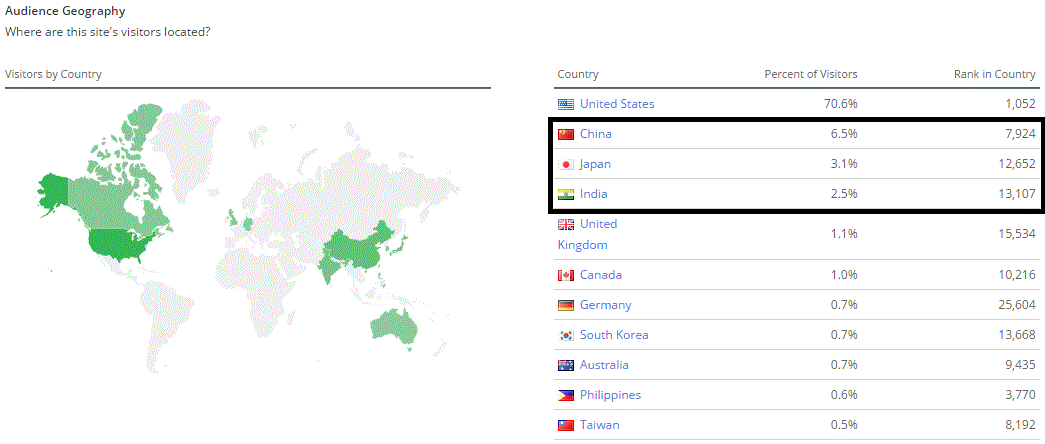
The Alexa profiles for other Utah-related
websites like
lds.org,
mormon.org,
byui.edu,
or
uvu.edu show that there are very few visitors from
these countries. Why are they so much more common for
byu.edu? It is probably because they are
(in large part) coming to BYU to use the BYU corpora, rather than
to use or see other
resources at BYU.
|
To the degree that we really believe that
"the world is our campus", the BYU corpora are perhaps
the best resource for attracting people from throughout the world
to BYU -- especially from places like China or India, where
BYU and its sponsoring institution have a very limited presence. |
In summary, the BYU corpora are used more than
almost any other website on campus, and the users
of these corpora are coming from throughout the
world -- including many countries from which very
few people visit other websites at BYU.
And whereas many other websites at BYU are
created and maintained by large teams of developers
(think of the Learning Suite team or the many
developers at Independent Study), the BYU corpora
are created and maintained by
just
one person. And this one person takes care of
all other aspects of the BYU corpora as well (in addition to the creation
and maintenance of the corpora) -- such as user registration, administration of
academic licenses (with many of the top universities in the US and worldwide),
and help/support (which constitutes hundreds of emails each month) -- and all of
this in
addition to
research and teaching.
Of course it is
important to have BYU faculty in the classroom,
teaching perhaps a handful of students in a given
class. But it is also important to support resources
like the BYU corpora, which provide outreach to
hundreds of thousands of people throughout the world
each month -- especially when their only point of
contact with BYU is via their visit to BYU to use these corpora.
|